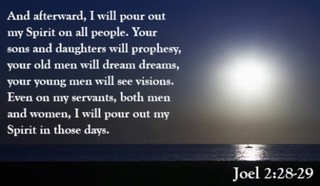- Recent Translations
- All Translations
Yuēĕrshū 2:2
Share
Settings
Yuēĕrshū 2:2 Meaning and Commentary
A day of darkness and of gloominess, a day of clouds and of
thick darkness
Alluding to the gloomy and thick darkness caused by the locusts, which sometimes come in prodigious numbers, like thick clouds, and darken the air; so the land of Egypt was darkened by them, ( Exodus 10:15 ) ; historians and travellers relate, as Bochart F6 has shown, that these creatures will fly like a cloud, and darken the heavens at noonday, cover the sun, and hinder the rays of it from touching the earth; though all these phrases may be expressive of great afflictions and calamities, which are often in Scripture signified by darkness, as prosperity is by light; see ( Isaiah 8:22 ) ( 9:1 ) ; as the morning spread upon the mountains;
as the morning light, when it first appears, diffuses itself in a moment throughout the earth, and is first seen on the tops of the mountains F7; so these locusts, and this calamity threatened, should suddenly and at once come, and be spread over the whole land; and which could no more be resisted than the morning light. The Vulgate Latin version renders it, in connection with the next clause, "as the morning spread upon the mountains, a people much and mighty"; but the accents will not admit of it; though it may seem a little improper that the same thing should be as a dark day, and: the morning light; wherefore Cocceius understands the whole of the day of Christ, which was light to many nations, and darkness to the wicked Jews: a great people and a strong;
numerous and mighty, many in number, mighty in strength; so the locusts are represented as a nation and people for might and multitude, ( Joel 1:6 ) ; an emblem of the Chaldeans and Babylonians, who were a large and powerful people: there hath not been ever the like, neither shall any more after it,
[even] to the years of many generations;
that is, in the land of Judea; otherwise there might have been the like before in other places, as in Egypt, and since in other countries. Jarchi, Aben Ezra, and Kimchi, account for it thus; that it was never known, before or since, that four kinds of locusts came together; as for the plague of Egypt, there was but one sort of them, they say; but it is best to understand it of the like not having been in the same country: and such a numerous and powerful army as that of the Chaldeans had not been in Judea, and made such havoc and desolation as that did; nor would any hereafter, for many generations, even until the Romans came and took away their place and nation.
F6 Hierozoic. par. 2. l. 4. c. 5. p. 479.
F7 "Postera vix summos spargebat lumine montes Orta dies----", Virgil. Aeneid. 12.

